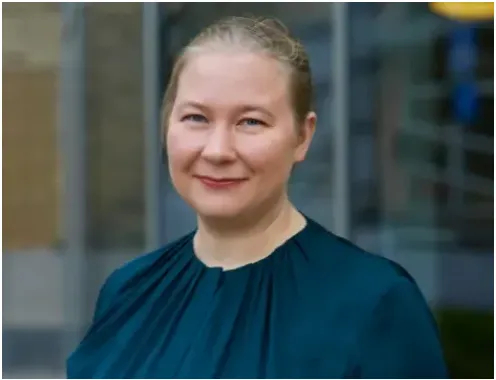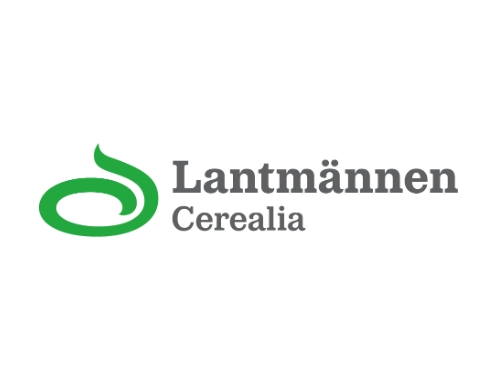Tiia Ranta - Chief Financial Officer at Lantmännen Cerealia


Tiia Ranta is the CFO at Lantmännen Cerealia in Stockholm, where she’s been for over three years. She previously spent seven years with VAASAN in Helsinki. Tiia started her Finance career as an Accounting Assistant, before becoming a Financial Controller, Finance Director, and CFO.
What does the future of sustainability look like in your sector?
We are in the food business and Lantmännen as a company has sustainability close to heart as we are owned by Swedish farmers. We have a lot of actions on going in that and we try to take action throughout the whole value chain.
In Cerealia, we want to make sure that our business models are very sustainable, and that we have sustainable production and sustainable logistics. For example, we want to be fossil-free in our production.
Lantmännen has a program called Climate and Nature. We make sure that we can have sustainably produced grain on the farms and throughout the value chain.
For us in Cerealia, we can use it for creating strategic partnerships. When we have customers who are high on the sustainability agenda, for example Paulig, we can provide them with sustainable flour for their production. That’s really the benefit we have seen.
Now we have launched the program in Finland. Hopefully, the consumers will see the benefit from that because it is a bit more expensive obviously to have fossil-free farming.
What would you say is the future of Finance?
I think we are the right hand for the business, being true business partners to the CEOs, so that we actively can impact the business decisions.
We are actively involved in building the strategies and making the strategies happen. Of course, artificial intelligence is also helping in this a lot as you can use the systems to do things that you couldn't do manually, because it's too time-consuming or there’s too much data.
But you should never forget that Finance always has this other side of having control of the business, having the compliance, and ensuring that everything is in order. You need to balance those aspects in Finance.
How do you see the Swedish economy evolving in the next five years?
It’s not a very good time at the moment, which will probably continue for some time, but anything can happen in five years.
Sweden has some of the basics still there. I think Sweden will bounce back when we get inflation in order and interest rates are going to start to balance and stabilise.
At the moment, it is very difficult for people, and you can see it in consumption; they are very careful about how they are consuming – and maybe that's good at this stage.
It's similar to COVID-19, if you think two years back to how different the world was compared to today. It went back to normal, and I think that's what will happen in the economy in the long term. Or maybe you get out a bit stronger.
The businesses that really have a strong balance sheet can come out of this very much stronger because if they are wise, they can use this time to really make sure that they have all the basics in place, working with the core, when things start to open up again, they can just fly. However, the smaller businesses might struggle a bit more.
What is the most memorable moment in your career and why?
There are many memorable moments, but I would say my latest career move because I got the chance to relocate from Helsinki to Stockholm and that was something that we as a family had discussed. Our daughter was going to an English-speaking school, so we were preparing for that already.
When you get the chance to relocate, it is really great. Stockholm and Helsinki aren’t that far away, so it is easy to fly back and forth to see family and friends.
It's the recognition when you get that opportunity inside the company that you already work for. That is most memorable for obvious reasons.
What has been the most rewarding moment in your career?
In general terms, it's usually when you get a task where you feel, “I have no clue how to do this,” and then you push yourself and deliver on the task. Those are very rewarding times.
When you finalise really big projects that you're working on and see the end result. It's really rewarding to accomplish something new.
The past 12 months have been quite turbulent in the market. What have you learned as a leader during this time?
The market has been extremely turbulent, and you have to learn to live in a new world. As a leader, you need to have a completely different kind of focus.
For example, we at Cerealia were in the middle of a growth phase and then everything happened. You turn your focus from growth back to cost control, savings, and those kinds of things, which are maybe not so motivating, nice, or fun, but it's something you have to do. That’s your personal focus.
As a leader, you need the rest of the organisation and your team to follow you, and you need to make them understand the importance and take responsibility, as well. That has been my learning as a leader - how to really involve the whole organisation in that task and make them understand the seriousness of the situation.
What do you do to retain high-potential employees?
Lantmännen has a programme and a structure in place to look for and retain talents.
First of all, we do talent mapping or update on a yearly basis, and we always go through that mapping in different layers in the group management team. Also, HR has quarterly meetings to talk about it, because we also want to compare across the businesses in Lantmännen.
With the high potentials, we have leadership programmes, but we can also provide mentoring and other solutions. On top of daily communication, we always try to have individual discussions two times a year; that's where we do the development discussion. We are very active in their career planning.
What advice would you give to those who want to stand out in the job market?
The CV needs to have the relevant competence. It is about being active, being proactive, being interested in what is happening, and being open to different things.
If you are very narrow, then that might be challenging, or if you don't have any flexibility.
Did you plan out your career path and what was that development like?
No, that's the funny thing - I don't think I have ever planned for it. I can say that I have always been in certain positions where I have felt that this might be a cool next step, but I have never really done any formal planning around it.
I have always said that I have high ambitions. I can still remember, 15 years back, I was thinking that this position would be great and would be challenging for me. Now, you look back and you're like, “Yeah, it was challenging, but it was fun.”
Do you have any advice for those who may want to become a CFO or CEO?
To me, what has always been number one is to always do good work. Sometimes you get very interesting tasks and sometimes you get really rubbish tasks but doing all of that with high quality is always a prerequisite because that's how you can start to show that you actually want to take responsibility and that you have the competence to do your work.
On the other hand, being curious, stepping in, and being proactive shows that you are carrying your current position well, and then you can always get your next chance.
You may get a task where you don’t really know if you are competent enough to do it, but just be brave and try. That will show that you are up for the next challenge.
In your words, how would you define the role of a CFO?
When I think of modern CFOs, of course we have to have a financial background, but what we want to be is a strategic partner for the business, bringing in the numbers to support business decisions.
We are the ones who have a holistic view of the business and what is happening. I try to have my ears everywhere. I say that if there's something happening in this company that I don't know about, then we are in trouble because I need to know. I need to understand how it impacts my three-year perspective. I need to be the spider in the web that has connections everywhere.
I describe myself as a storyteller because I know the numbers, but we need to be able to explain how the business is doing.
What would you say are the effects of business intelligence and data on the function?
That is the core when we want to provide proper insights because we want businesses to be able to make fact-based decisions. We need to provide them with the data, the analysis, and the tools to be able to do that.
Finance will push this, because they are self-serving tools. People should be able to log in and see the data; if they want the sales report, they can go into the system and look at the sales, and do a bit of drilling and different analysis.
That changes the role of a Business Controller, because then you are not only reporting or printing reports for the business, but you can actually be the true business partner that you want to be, because then you should have more time for that, instead of doing manual things that are not really adding value.
Is there a specific person in business that has been really inspiring for you and why?
I'm not sure if I can name just one person. But when I have changed my position, for me, it's very important to know who the senior management is because you can always learn a lot from the people you work with and your manager.
I always want to make sure that it's a person where I really feel that, OK, they have this experience that I can learn from and that is very inspirational for me. I have been lucky enough to have a lot of those people during my career.
Thank you to Tiia for speaking to Hanna Gibson, Senior Consultant in our Nordics division.
Views and opinions contained within our Executive Interviews are those of the interviewee and not views shared by EMEA Recruitment.






You can also use your social account to sign in. First you need to:
Accept Terms & Conditions And Privacy Policy